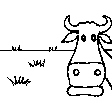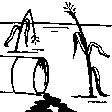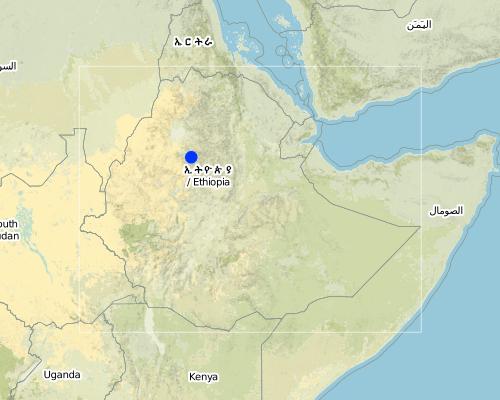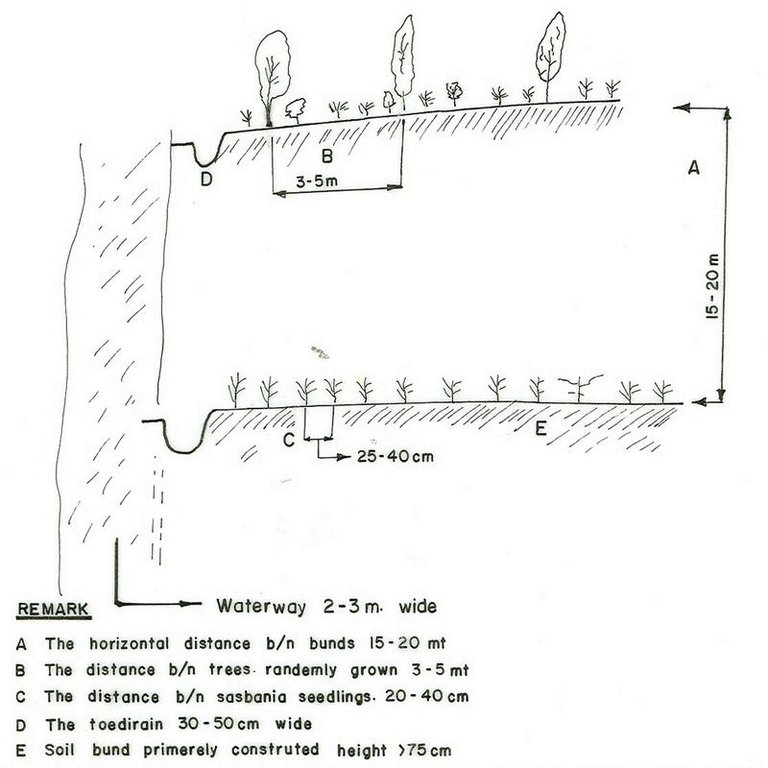Graded Soil bund [أثيوبيا]
- تاريخ الإنشاء:
- تحديث:
- جامع المعلومات: Unknown User
- المحرر: –
- المُراجع: Fabian Ottiger
Yafer Erken (Amharic)
technologies_1060 - أثيوبيا
عرض الأقسام
توسيع الكل طي الكل1. معلومات عامة
1.2 تفاصيل الاتصال بالأشخاص الرئيسيين لمصدر المعلومات والمؤسسات المشاركة في تقييم وتوثيق التقنية
الشخص (الأشخاص) الرئيسي لمصدر المعلومات
متخصص في الإدارة المستدامة للأراضي:
Tadel Getachew
Office of Agriculture and Rural Development
Wobe Kebele DA, Motta, P.O.Box 31
أثيوبيا
اسم المؤسسة (المؤسسات) التي سهلت توثيق/تقييم التقنية (إذا كان ذلك على صلة)
Ministry of Agriculture and Rural Development of Ethiopia (Ministry of Agriculture and Rural Development) - أثيوبيا1.3 الشروط المتعلقة باستخدام البيانات الموثقة من خلال WOCAT
متى تم تجميع البيانات (ميدانيا)؟:
10/11/2005
يوافق جامع المعلومات والشخص (لاشخاص) الرئيسي لمصدر المعلومات على الشروط المتعلقة باستخدام البيانات الموثقة من خلال WOCAT:
نعم
2. وصف تقنيةالإدارة المستدامي للأراضي
2.1 وصف مختصر للتقنية
تعريف التقنية:
It is an embankment of soil with no gradient along the contour and stablized with grasses, tree/shrub plant species.
2.2 وصف تفصيلي للتقنية
الوصف:
The technology cosists of an embankment of soil accross the slope, cutoff drains constructed at a given interval, water ways for disposing runoff from the bunds and cutoff drains, vegetative measures and agronomic practices on cultivated lands. The structures are laid out at a gradient of 1% in order to safely drain excess water. The immidiate result expected is the control of soil erosion, well drained soils control land degradation, decrease slope length and angle and then sustain productivity. The mantainance is frequently done by removing the silt from the channel and repairing the broken part of the bunds and also stablize the bund by planting. The technology is suitable to high rainfall area where crop fields experience seasonal waterlogging. The surplus water needs to be drained by the help of graded channels of smaller gradients. The channels should be properly constructed in a way no channel scour or sediment deposition takes place. Cutoff drains need to be placed at given interval to reinforce the graded bunds. Waterways are paved with stone to avoid channel scour because of the higher gradients involved in waterway construction.
2.5 البلد/المنطقة/المواقع التي تم تنفيذ التقنية فيها والتي يغطيها هذا التقييم
البلد:
أثيوبيا
المنطقة/الولاية/المحافظة:
Amhara
مزيد من التفاصيل حول الموقع:
Hulet Ejju Enese
Map
×2.6 تاريخ التنفيذ
في حالة عدم معرفة السنة بالتحديد، يرجى الإشارة إلى التاريخ التقريبي:
- منذ أقل من 10 سنوات (مؤخرًا)
2.7 إدخال التقنية
حدد كيف تم إدخال التقنية:
- من خلال المشاريع/ التدخلات الخارجية
التعليقات (نوع المشروع، الخ):
The technology was practiced by land users but not designed properly. It is the result of modifications of traditional technologies and adding some new elements improved techniques.
3. تصنيف تقنية الإدارة المستدامي للأراضي
3.1 الغرض الرئيسي ( الأغراض الرئيسية) للتقنية
- تحسين الإنتاج
- الحد من تدهور الأراضي ومنعه وعكسه
3.2 نوع (أنواع) استخدام الأراضي الحالية حيث يتم تطبيق التقنية

الأراضي الزراعية
- زراعة سنوية
المحاصيل الرئيسية (المحاصيل النقدية والغذائية):
Major cash crop annual cropping: Teff, wheat
Major food crop annual cropping: Teff, maize
Major cash crop tree and shrub cropping: Eucalyptus
Major food product livestock: Meat, milk
Major other purpose of livestock: Sale of live animals

أراضي الرعي
أراضي الرعي الواسع النطاق:
- رعي شبه مرتحل
التعليقات:
Major land use problems (compiler’s opinion): expansion of gullies, loss of top soil, fertility decline/poor land productivity and free grazing.
Major land use problems (land users’ perception): decrease productivity, gullies expansion, unable to practice relay cropping.
Semi-nomadism / pastoralism: on communal grazing lands
Grazingland comments: Livestock production is decreasing because of decreasing grazing land and its productivity.
Type of cropping system and major crops comments: Teff-vetch, teff-wheat-maize-teff
3.3 مزيد من المعلومات حول استخدام الأراضي
إمدادات المياه للأرض التي يتم تنفيذ التقنية عليها:
- بعلية
التعليقات:
Water supply: Also mixed rainfed - irrigated and post-flooding
حدد:
Longest growing period in days: 240 Longest growing period from month to month: Apr - Oct
3.4 مجموعةالإدارة المستدامة للأراضي التي تنتمي إليها هذه التقنية
- التدابير المتقاطعة للمنحدرات
3.5 انتشار التقنية
حدد انتشار التقنية:
- منتشرة بالتساوي على مساحة
إذا كانت التقنية منتشرة بالتساوي على منطقة ما، فحدد المنطقة التقريبية المغطاة:
- 100-10 كم2
التعليقات:
Total area covered by the SLM Technology is 78.69 m2.
Soil bund is applied in combination with cutoff drain, water ways and plantations.
3.6 التدابير التقنية في مجال إلادارة المستدامة للأراضي
3.7 الأنواع الرئيسية من تدهور الأراضي التي تناولتها التقنية

تآكل التربة بالمياه
- الوزن(Wt): فقدان التربة السطحية/تآكل السطح
- (Wg):الانجراف الخلجاني/ الخلجان

التدهور الكيميائي للتربة
- (Cn): تراجع الخصوبة وانخفاض محتوى المادة العضوية (غير ناتج عن الانجراف)
التعليقات:
Main type of degradation addressed: Wt: loss of topsoil / surface erosion
Secondary types of degradation addressed: Wg: gully erosion / gullying, Cn: fertility decline and reduced organic matter content
3.8 منع أو حد أو عكس تدهور الأراضي
تحديد هدف التقنية فيما يتعلق بتدهور الأراضي:
- منع تدهور الأراضي
- الحد من تدهور الأراضي
التعليقات:
Main goals: mitigation / reduction of land degradation
Secondary goals: prevention of land degradation
4. المواصفات الفنية، وأنشطة التنفيذ، والمدخلات، والتكاليف
4.1 الرسم الفني للتقنية
4.2 المواصفات الفنية/شروحات الرسم الفني
Amhara
Technical knowledge required for field staff / advisors: high
Technical knowledge required for land users: moderate
Main technical functions: control of concentrated runoff: retain / trap
Secondary technical functions: improvement of ground cover, increase / maintain water stored in soil, water harvesting / increase water supply
Better crop cover
Material/ species: teff, wheat
Remarks: broad casting
Relay cropping
Material/ species: vetch
Remarks: broad casting
Contour planting / strip cropping
Material/ species: maize
Remarks: 40cm between rows & 20 cm between plants
Agronomic measure: removing less vegetation cover
Material/ species: wheat
Quantity/ density: 40%
Remarks: broad casting
Manure / compost / residues
Material/ species: cow dung, compost
Mineral (inorganic) fertilizers
Material/ species: DAP, UREA
Remarks: 1 qt. DAP & 0.5 qt UREA
Rotations / fallows
Material/ species: on grass lands
Remarks: at least 1 year rotation
Contour ridging
Remarks: using BBM
Aligned: -graded strips
Vegetative material: T : trees / shrubs
Number of plants per (ha): 4000
Vertical interval between rows / strips / blocks (m): 1
Spacing between rows / strips / blocks (m): 20
Vertical interval within rows / strips / blocks (m): 0.25
Width within rows / strips / blocks (m): 0.5
Scattered / dispersed
Vegetative material: T : trees / shrubs
Number of plants per (ha): 10000
Spacing between rows / strips / blocks (m): 1
Vertical interval within rows / strips / blocks (m): 1
Width within rows / strips / blocks (m): 1
Trees/ shrubs species: acacia, saligna,
Fruit trees / shrubs species: mango, guava, papaya
Perennial crops species: coffee
Grass species: local grasses, vetiver, elephant grass
Slope (which determines the spacing indicated above): 6.00%
If the original slope has changed as a result of the Technology, the slope today is (see figure below): 4.00%
Gradient along the rows / strips: 1.00%
Waterway
Spacing between structures (m): 200
Depth of ditches/pits/dams (m): 0.7
Width of ditches/pits/dams (m): 3
Length of ditches/pits/dams (m): 500
Height of bunds/banks/others (m): 0.8
Width of bunds/banks/others (m): 1
Length of bunds/banks/others (m): 500
Bund/ bank: graded
Vertical interval between structures (m): 1-2.5
Spacing between structures (m): 20
Depth of ditches/pits/dams (m): 0.3
Width of ditches/pits/dams (m): 0.5
Length of ditches/pits/dams (m): 150
Height of bunds/banks/others (m): 0.75
Width of bunds/banks/others (m): 1
Length of bunds/banks/others (m): 150
Structural measure: diversion ditch / cut-off drain
Vertical interval between structures (m): 50
Spacing between structures (m): 500
Depth of ditches/pits/dams (m): 0.5
Width of ditches/pits/dams (m): 1
Length of ditches/pits/dams (m): 250
Height of bunds/banks/others (m): 0.8
Width of bunds/banks/others (m): 1
Length of bunds/banks/others (m): 250
Construction material (earth): soil dug out from the ditches and piled as embankment
Construction material (stone): stone is used for paving the water ways
Construction material (wood): used for constructing checkdams
Slope (which determines the spacing indicated above): 6%
If the original slope has changed as a result of the Technology, the slope today is: 4%
Lateral gradient along the structure: 1%
Vegetation is used for stabilisation of structures.
Other type of management: change of management / intensity level - protect the structure from breaching.
4.3 معلومات عامة بخصوص حساب المدخلات والتكاليف
عملة أخرى/ عملة وطنية (حدد):
Birr
أشر إلى سعر الصرف من الدولار الأمريكي إلى العملة المحلية (إذا كان ذا صلة): 1 دولار أمريكي =:
8,6
اذكر متوسط تكلفة أجر العمالة المستأجرة في اليوم الواحد:
0.56
4.4 أنشطة التأسيس
| النشاط | نوع التدبير | التوقيت | |
|---|---|---|---|
| 1. | cultivation/weeding | نباتية | |
| 2. | collecting seedlings/seed | نباتية | onset of rain |
| 3. | transplanting/sowing on bunds | نباتية | rainy season |
| 4. | survey the line of embankment | بنيوية أو هيكلية | dry season |
| 5. | construct bunds, cutoff drai and waterways | بنيوية أو هيكلية | dry season |
| 6. | planting the structures | بنيوية أو هيكلية | rainy season |
4.5 التكاليف والمدخلات اللازمة للتأسيس
| تحديد المدخلات | الوحدة | الكمية | التكاليف لكل وحدة | إجمالي التكاليف لكل مدخل | % من التكاليف التي يتحملها مستخدمو الأراضي | |
|---|---|---|---|---|---|---|
| العمالة | Labour | ha | 1,0 | 99,0 | 99,0 | 100,0 |
| معدات | Animal traction | ha | 1,0 | 37,0 | 37,0 | 100,0 |
| المواد النباتية | Seeds | ha | 1,0 | 12,0 | 12,0 | 100,0 |
| الأسمدة والمبيدات الحيوية | Fertilizer | ha | 1,0 | 55,0 | 55,0 | 100,0 |
| إجمالي تكاليف إنشاء التقنية | 203,0 | |||||
التعليقات:
Duration of establishment phase: 24 month(s)
4.6 الصيانة/الأنشطة المتكررة
| النشاط | نوع التدبير | التوقيت/الوتيرة | |
|---|---|---|---|
| 1. | minimum tillage | زراعية | during planting / each cropping season |
| 2. | contour tillage | زراعية | dry season / each cropping season |
| 3. | relay cropping | زراعية | after 1st harvest / each cropping season |
| 4. | manuring | زراعية | after 1st plough / each cropping season |
| 5. | mineral fertilizer | زراعية | during sowing / each cropping season |
| 6. | fencing | نباتية | during harvesting /once |
| 7. | replanting | نباتية | rainy season / |
| 8. | pollarding | نباتية | before raining / |
| 9. | clearing the ditches | بنيوية أو هيكلية | onset of rain/as required |
| 10. | strengthning (maintain) the embankment | بنيوية أو هيكلية | onset of rain/as required |
| 11. | improve vegetative cover | بنيوية أو هيكلية | rainy season/ |
4.7 التكاليف والمدخلات اللازمة للصيانة/للأنشطة المتكررة (سنويًا)
| تحديد المدخلات | الوحدة | الكمية | التكاليف لكل وحدة | إجمالي التكاليف لكل مدخل | % من التكاليف التي يتحملها مستخدمو الأراضي | |
|---|---|---|---|---|---|---|
| العمالة | Labour | ha | 1,0 | 54,0 | 54,0 | 100,0 |
| معدات | Animal traction | ha | 1,0 | 34,0 | 34,0 | 100,0 |
| المواد النباتية | Seeds | ha | 1,0 | 12,0 | 12,0 | 100,0 |
| الأسمدة والمبيدات الحيوية | Fertilizer | ha | 1,0 | 55,0 | 55,0 | 100,0 |
| إجمالي تكاليف صيانة التقنية | 155,0 | |||||
التعليقات:
The calculation is for 1 ha land in SWC area, where the first year construction of SWC technology with normal cropping (Teff) production and recurrent cost is calculated for the second year for the same plot of land and production system.
4.8 أهم العوامل المؤثرة على التكاليف
قدم وصفا لأهم العوامل التي تؤثر على التكاليف:
labour, slope
5. البيئة الطبيعية والبشرية
5.1 المناخ
هطول الأمطار السنوي
- < 250 مم
- 251- 500 ملم
- 501 - 750ملم
- 1,000-751 ملم
- 1,500-1,100 ملم
- 2,000-1,500 ملم
- 3,000-2,001 ملم
- 4,000-3,100 ملم
- > 4000 ملم
المواصفات/التعليقات على هطول الأمطار:
1001-1500 mm (ranked 1, around 1100 mm)
751-1000 mm (ranked 2, low areas)
المنطقة المناخية الزراعية
- شبه رطبة
some crops have LGP >270
5.2 طوبوغرافيا
متوسط الانحدارات:
- مسطح (0-2%)
- بسيط (3-5%)
- معتدل (6-10%)
- متدحرج (11-15%)
- تلال (16-30%)
- شديدة الانحدار(31-60%)
- فائقة الانحدار (>60%)
التضاريس:
- هضاب/سهول
- أثلام مرتفعة
- المنحدرات الجبلية
- منحدرات التلال
- منحدرات في السفوح
- قاع الوادي
المنطقة الارتفاعية:
- 100-0 متر فوق سطح البحر
- 500-101 متر فوق سطح البحر
- 1,000-501 متر فوق سطح البحر
- 1,500-1,001 متر فوق سطح البحر
- 2,000-1,501 متر فوق سطح البحر
- 2,500-2,100 متر فوق سطح البحر
- 3,000-2,501 متر فوق سطح البحر
- 4,000-3,001 متر فوق سطح البحر
- > 4000 متر فوق سطح البحر
التعليقات والمواصفات الإضافية بشأن التضاريس:
Altitudinal zone: 2001-2500 m a.s.l. (The SWC area is within this range)
Slopes on average: Also moderate (ranked 2) and hilly (ranked 3)
5.3 التربة
متوسط عمق التربة:
- ضحل جدًا (0-20 سم)
- ضحلة (21-50 سم)
- متوسطة العمق (51-80 سم)
- عميقة (81-120 سم)
- عميقة جدًا (> 120 سم)
قوام التربة (التربة السطحية):
- متوسط ( طميي، سلتي)
- ناعم/ثقيل (طيني)
إذا كان متاحًا، قم بإرفاق وصف كامل للتربة أو تحديد المعلومات المتوفرة، على سبيل المثال نوع التربة، الرقم الهيدروجيني/ درجة حموضة التربة، قدرة التبادل الكاتيوني، النيتروجين، الملوحة وما إلى ذلك.
Soil depth on average: Also deep (ranked 2) and shallow (ranked 3)
Soil texture: Medium (ranked 1, major component is clay loam) and fine/heavy (ranked 2)
Soil fertility: Medium (ranked 1, use of chemical fertilizer is increasing every year), low (ranked 2) and very low (ranked 3)
Soil drainage/infiltration: Medium (ranked 1), poor (ranked 2) and good (ranked 3)
Soil water storage capacity: High (ranked 1), low (ranked 2, ground water level is decreasing every year) and very low (ranked 3)
5.6 خصائص مستخدمي الأراضي الذين يطبقون التقنية
التوجه السوقي لنظام الإنتاج:
- الكفاف (الإمداد الذاتي)
- مختلط (كفاف/ تجاري)
الدخل من خارج المزرعة:
- أقل من % 10من كامل الدخل
المستوى النسبي للثروة:
- ضعيف
- متوسط
مستوى المكننة:
- عمل يدوي
- الجر الحيواني
اذكر الخصائص الأخرى ذات الصلة لمستخدمي الأراضي:
Population density: 200-500 persons/km2
Annual population growth: 2% - 3%
35% of the land users are average wealthy and own 40% of the land (they take care of their land).
40% of the land users are poor and own 35% of the land (they construct SWC but no follow up).
25% of the land users are poor and own 25% of the land (some times they rent out their land for others).
Off-farm income specification: Farmers have so far not been engaged in any type off-farm activites in the area.
Level of mechanization: Animal traction (ranked 1, local plough) and manual work (ranked 2)
Marekt orientation: Subsistence (ranked 1) and mixed (ranked 2, some crops and livestock products)
5.7 متوسط مساحة الأرض المملوكة أو المستأجرة من قبل مستخدمي الأراضي الذين يطبقون التقنية
- < 0.5 هكتارا
- 0.5 - 1 هكتار
- 1 -2 هكتار
- 2 - 5 هكتار
- 5 - 15 هكتار
- 15 - 50 هكتار
- 50 - 100هكتار
- 500-100 هكتار
- 1,000-500 هكتار
- 10,000-1,000 هكتار
- > 10,000 هكتار
التعليقات:
0.5-1 ha: Most of the young generation are classified under this category. Also grazing land is converted to cultivation
5.8 ملكية الأراضي، وحقوق استخدام الأراضي، وحقوق استخدام المياه
ملكية الارض:
- دولة
حقوق استخدام الأراضي:
- فردي
6. الآثار والتصريحات الختامية
6.1 الآثار التي أظهرتها التقنية في الموقع
الآثار الاجتماعية والاقتصادية
الإنتاج
إنتاج المحاصيل
إنتاج الأعلاف
جودة العلف
إنتاج الخشب
منطقة الإنتاج
التعليقات/ حدد:
especially for the first 1-2 years
إدارة الأراضي
التعليقات/ حدد:
lack of consulting the farmer
الدخل والتكاليف
دخل المزرعة
الآثار الاجتماعية والثقافية
المؤسسات المجتمعية
المعرفة بالإدارة المستدامة للأراضي/تدهور الأراضي
Land border security
التعليقات/ حدد:
Bunds are baundary of farm plots
الآثار الايكولوجية
دورة المياه / الجريان السطحي
الجريان السطحي
الكمية قبل الإدارة المستدامة للأراضي:
50
الكمية بعد الإدارة المستدامة للأراضي:
30
تصريف المياه الزائدة
التربة
رطوبة التربة
غطاء التربة
فقدان التربة
التعليقات/ حدد:
Unless improper design
المادة العضوية في التربة/تحت الطبقة c
الآثار الايكولوجية الأخرى
Soil fertility
Biodiversity
6.2 الآثار التي أظهرتها التقنية خارج الموقع
الفيضان في اتجاه مجرى النهر
تلوث المياه الجوفية/الأنهار
الرواسب المنقولة بواسطة الرياح
6.4 تحليل التكلفة والعائد
كيف يمكن مقارنة العوائد نسبة لتكاليف الإنشاء (من وجهة نظر مستخدمي الأراضي)؟
عوائد قصيرة الأجل:
إيجابي قليلا
عوائد طويلة الأجل:
ايجابي جدا
كيف تتم مقارنة العوائدمع كلفة الصيانة/التكاليف المتكررة (من وجهة نظر مستخدمي الأراضي)؟
عوائد قصيرة الأجل:
إيجابي
عوائد طويلة الأجل:
ايجابي جدا
6.5 اعتماد التقنية
التعليقات:
Comments on acceptance with external material support: estimates
100% of land user families have adopted the Technology without any external material support
Comments on spontaneous adoption: survey results
There is a moderate trend towards spontaneous adoption of the Technology
Comments on adoption trend: In the SWC area more than 75% of the households adopted the technology. They include stone walls to reinforce soil bunds. Stone walls have the disadvantage of harbouring rodents and hence soil bunds are preferred.
6.7 نقاط القوة / المزايا / الفرص التي توفرها التقنية
| نقاط القوة/ المزايا/ الفرص من وجهة نظر مستخدمي الأراضي |
|---|
| protect the land from soil erosion |
| نقاط القوة/ المزايا/ الفرص من وجهة نظر جامع المعلومات أو غيره من الاشخاص الرئيسيين لمصدر المعلومات |
|---|
|
control loss of top soil and water and enhances sustainable production. How can they be sustained / enhanced? proper layout, integrated with other techniques and modification based on farmers intersts. |
| suficient soil moisture retention in the lower altitudes. |
6.8 نقاط ضعف / مساوىء / مخاطر التقنية وسبل التغلب عليها
| نقاط الضعف/ المساوىء/ المخاطر من وجهة نظر مستخدم الأراضي | كيف يمكن التغلب عليها؟ |
|---|---|
| closer bunds are obstacle for farm operation | modify based on farming system local conditions |
| loss of land | make the bund productive |
| rodent and pest | provision of approprate measures |
| runner grass | proper management of the land |
| نقاط الضعف/ المساوىء/ المخاطر من وجهة نظر جامع المعلومات أو غيره من الاشخاص الرئيسيين لمصدر المعلومات | كيف يمكن التغلب عليها؟ |
|---|---|
| area occupied by bund | increase the productivity of land per unit area by planting fruit tree, forage plants on the bund |
الروابط والوحدات المواضيعية
توسيع الكل طي الكلالروابط
لا يوجد روابط
الوحدات المواضيعية
لا يوجد وحدات مواضيعية



